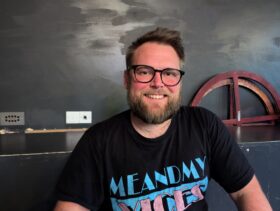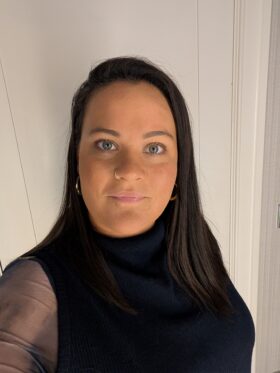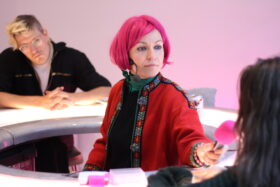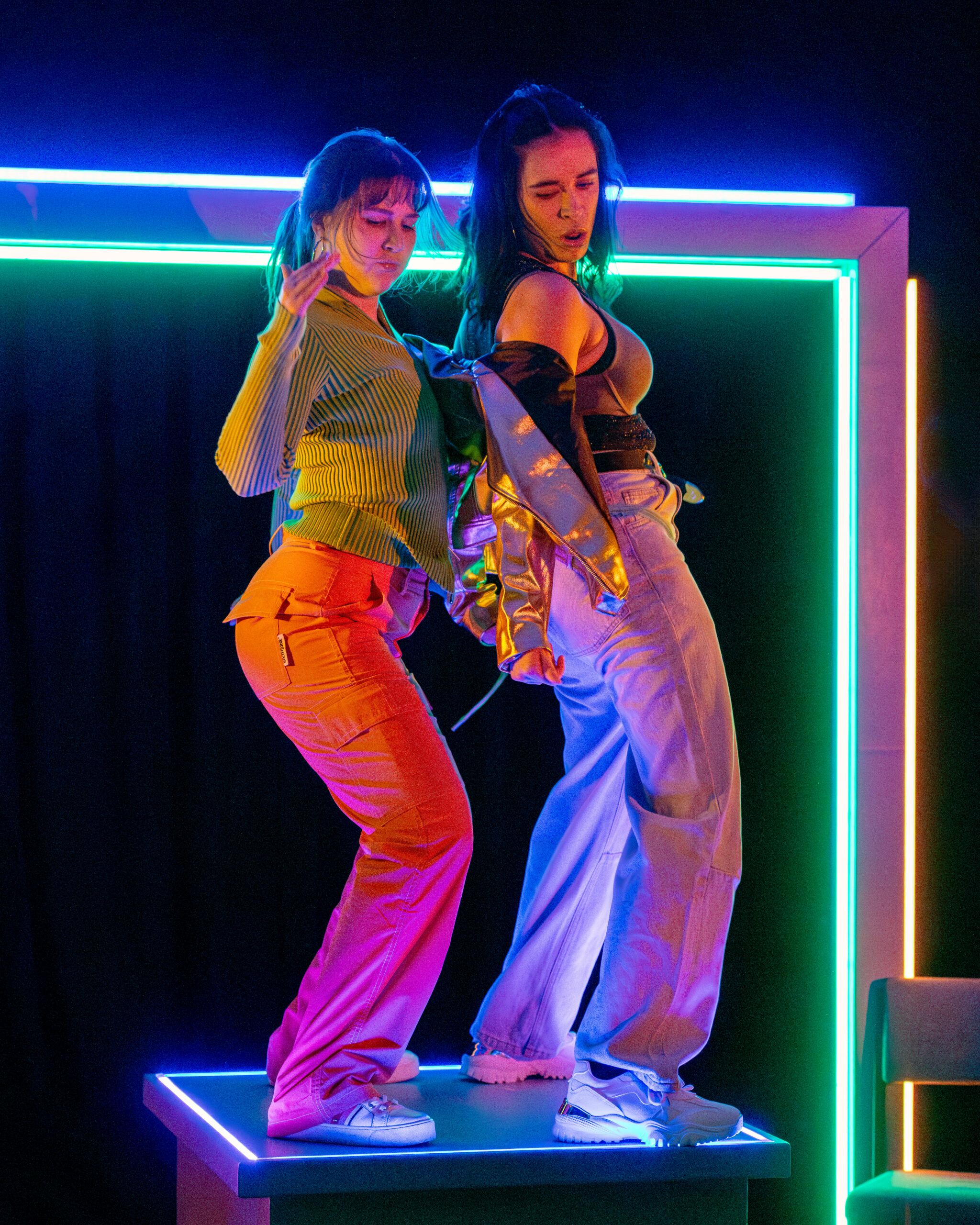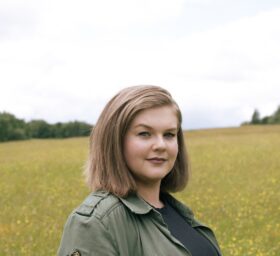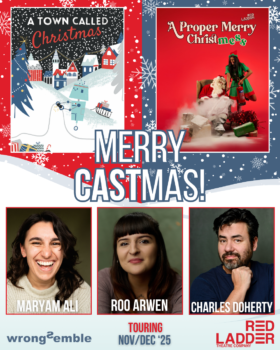News
The rise and fall of Mary Bateman – aka ‘the Yorkshire Witch’ – with MUTTON writer and Brave Words’ artistic director Chris Singleton
MUTTON is a new dark comedy from Leeds-based theatre company Brave Words, exploring the life and times of Mary Bateman, aka the Yorkshire Witch, and how the desperation of ordinary folk in the early 1800s has parallels with our world today. MUTTON is written by Chris Singleton, artistic director of Brave Words. Here, Chris explains the inspiration behind the play, which comes to Hawksworth Village Hall, Leeds, on Nov 19, and St John’s Parish Hall, Staincross, Barnsley, on Nov 28…
Where did the idea for MUTTON come from?
I was writer in residence at Leeds Central Library in 2019 and started doing some digging into the wrongdoing and mischief that had occurred in Leeds over the centuries and that’s when I came across Mary Bateman’s story. I immediately thought it would make a cracking play in a kind of League of Gentlemen-esque, Fleabag kind of style, where the female lead talks directly to the audience. I started writing a play in 2023 and two years later we got some funding to make it.
Who was Mary Bateman and what do we know about her?
Mary was a woman living in poverty, like a lot of people, in the late 18th and early 19th centuries. She grew up in North Yorkshire and got a bit of a reputation as a thief and wrongdoer from a very early age. By the time she was five, she was described as ‘knavish’ and ‘vicious’ and this reputation followed her around. She moved to Leeds and continued her career of crime, probably as a way to survive but also as a compulsion. Amongst her crimes – and this is where the title of the play comes from – she intercepted a butcher’s boy on his delivery round and demanded a leg of lamb saying the Lord wanted it and snatched it from him and took it home for her tea.
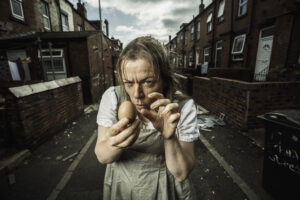
MUTTON
How did Mary become known as the Yorkshire Witch?
She was a fortune teller and sold charms under a multitude of aliases, but her biggest con was what became known as the ‘Prophet hen of Leeds.’ She wrote ‘Christ is coming’ on a load of eggs using either vinegar or acid, hilariously misspelling Christ, writing it without the ‘h’. There are various accounts, but it seems she convinced some people that her hen was laying these holy eggs and charged people a penny a go to see them. She became a bit of a local celebrity through her ‘holy hen’ and prophesying the end of the world. However, she became increasingly malicious and started poisoning people to keep them under her control, convincing them they needed her healing skills. Mary eventually poisoned the wrong person and was caught. She was imprisoned in York and later hanged in front of what was believed to be a record crowd of between 5,000 and 10,000 people. It was reported that some had walked all the way from Leeds to see the hanging, either because they had been her victims or wanted to see if the Yorkshire Witch had one final spell that would help her escape the gallows, which, of course, she didn’t.
Why did you want to tell her story on stage?
Back in the early 1800s a lot of people were living in poverty, the Industrial Revolution was underway and there was fear of new technology in the mills and factories and people were desperate for anything that might make their lives a little bit better. That’s why Mary was successful, people wanted to believe in something. As I was writing the play I kept thinking about the similarities with today. People are struggling, they’re worried about new technology in the form of AI and being conned by false prophets who claim they have the answers.
Also, Mary herself was a woman who grew up with no agency over her life and took agency by pretending to have magic powers, and we wanted to explore the idea of a woman living in what was a very patriarchal society. We’re not trying to say she wasn’t a villain, because she was, but I wanted to explore the reasons that might lead someone to do the audacious things she did.
Can you talk a bit about the play itself?
The play opens on the gallows moments before Mary is hanged and it ends on the gallows. In between is Mary telling a version of her story to the audience, alongside a collection of characters she conned during her life. It’s framed around the idea of who tells our stories and it also raises questions about can we trust the people who tell them?
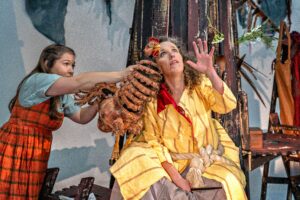
MUTTON rehearsal credit Ant Robling
Why are we still interested in witchcraft and prophecies?
In the early 1800s, witchcraft wasn’t anywhere near as prevalent as it had been a couple of centuries earlier, but people were still fascinated by it and I don’t think that fascination has ever gone away. People are still interested in stories about magic and witchcraft.
How is Mary’s story relevant to a modern audience?
The idea of Mary claiming to be able to make people’s lives better when doing it for selfish reasons is something that chimes with our world today. Mary was a charismatic person who was able to convince people of things. She was a grifter, who was running from one con to the next, who would jump on a bandwagon if she thought it would benefit her. You only have to look at the world of politics to see this is still happening today.
What do you hope audiences take away from watching MUTTON?
We’re in a world now where so many high-profile voices are competing for people’s attention and some of those are doing it for selfish reasons. I hope the play makes people who come to see it think about why we believe in certain things and certain people, and not others. The play revolves around three main characters – Mary, Old Nan, who taught her about witchcraft, and Winnie, who Mary attempts to teach to be a witch – so as well as telling Mary’s story we’re also exploring the passing of experiences between generations, and whether you can stand up for what you believe in when somebody is trying to make you believe in something else.
To book tickets visit: Red Ladder Theatre Company or go to Mutton — BRAVE WORDS
“Art is a human right and we should all have the opportunity to be creative.” – Coralie Datta
“I have people who come to my sewing group each week and for some of them that’s the one time when they push themselves to get out of the house because their mental health is not good enough to sustain them going out all the time. But knowing they can come to this class and be safe and feel welcomed is really important to them” – Coralie Datta
Growing up in Hackney, in London, during the 90s, I feel like I had a culturally privileged upbringing in that there were lots of arts-related things happening all around us. Looking back, it feels like something of a heyday and as a child I was fortunate to be surrounded by community arts – I remember my whole family was involved in a community opera.
So the idea of being creative was always there for me from an early age, though my mum’s view was ‘you’re not going to make loads of money from doing that’. But it didn’t stop me pursuing it as a career.
I studied photography at university in Hereford, and went on to set up Coralie Datta Photography, which I still run today. And after moving to Leeds I did a masters degree in curation.
For the past four years I’ve been working for Space2 – an arts and social change charity based in east Leeds. I work across a wide range of community projects including Common Threads, which teaches people to sew across east Leeds, and I help run a photography project that encourages men to take pictures about their mental health.
I’ve also been heavily involved in a heritage project looking at the history of Gipton’s Old Fire Station (where Space2 is based) which has led me to producing my first stage production, Trailblazing – a new play inspired by the real-life stories of female firefighters from Yorkshire, spanning from the Second World War to the present day.
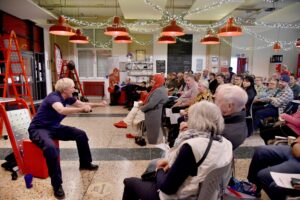
Trailbazing credit Coralie Datta
It follows the stories of three different women who reminisce about their experiences, from air raids and car accidents to farm fires, hosing down elephants, and even delivering old fire engines to Ukraine. It’s a one woman show that’s just done an initial tour and will head out again for a bigger tour in January.
The is the second project that Space2 has worked on about Leeds fire heritage and it started two years ago. The project works on uncovering women’s stories in the fire service. As part of the funding, I knew there was going to be a one women theatre show so from the start of the project I began thinking about what stories of women firefighters we could use. I then passed my thoughts over to a scriptwriter who then turned these ideas into an incredible script, something I could never have done. I really enjoyed this collaboration, and it continued with the director, set designer and performer.
I’ve learned that theatre can be such a powerful way of telling stories. I knew that already because I’ve seen a lot of theatre, but actually producing a story for the stage and seeing how someone else tells that story has been really illuminating.
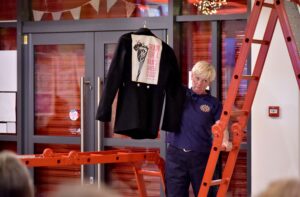
Jane Morland in Trailbazing credit Coralie Datta
It’s also a reminder of why the arts matter. I think sometimes they’re seen as for someone else, or not a space for everyone. But for me, art is a human right and we should all have the opportunity to be creative.
I’ve seen firsthand the difference this can make. I have people who come to my sewing group each week, and for some of them that’s the one time when they push themselves to get out of the house because their mental health is not good enough to sustain them going out all the time. But knowing they can come to this class and be safe and feel welcomed is really important to them.
It’s hard these days to make a sustainable living from the arts, but being able to share stories and offer safe spaces for people to be creative is so important.
Coralie Datta is a community development worker at Space 2, an award-winning arts and social change charity based in east Leeds, where she runs community sewing groups and just produced her first theatre production, Trailblazing, which tells the story of our female firefighters from the Second World War to the present day. Coralie has a background in photography and curation – she runs Coralie Datta Photography – and is a Red Ladder trustee.
“Despite the funding challenges that exist today in the creative world, there are still a heck of a lot of opportunities and resources in the North.” – Richard D Rhodes
I was five years old when I told my parents I was going to be a writer. They, being sensible Bradford parents, said ‘don’t be daft’ and suggested I got a ‘proper’ job. So I did. After leaving school, a stint in Leeds Polytechnic’s Law School and finishing my degree with the Open University after being inspired by Educating Rita, I spent 15 years working in personal finance, finishing as a bank manager in London. Then, under initiatives sponsored by New Labour in the early noughties, I moved into primary education, benefitting from new routes into teaching which meant you didn’t have to go back to university or college, and instead you could learn on the job.
So, I switched careers and trained as a primary school teacher, working my way up to Head Teacher over the next 20-odd years. It was rewarding and enjoyable but, when the pandemic struck, I found myself buried under 70 hour weeks. When life returned to normal, these working hours remained much the same, at which point I felt I had done my bit and started thinking about how I could fulfil my childhood dream of being a writer.
Over the years I’d done school productions, writing bits and pieces for kids, but I hadn’t really dedicated any real time to ‘proper’ writing, so I decided to bite the bullet and took early retirement. I was living in Buckinghamshire at the time. So I sold up and moved back North, meaning I could be free from mortgage slavery and where my actuarily sliced pension might just be enough to get by on. That was two-and-a-half years ago. I must admit that, when I left the South-East, I thought I’d be consigning myself to a world of little writers’ groups in the local library – not that they are to be sniffed at, great work goes on in them – and that would be the extent of the opportunities in the North, but when I arrived up here I discovered so much more.
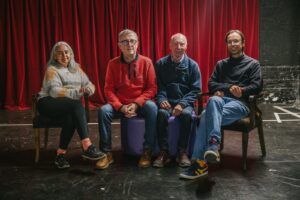
Richard with the ‘Think Again’ writers, a tour of 4 new short plays, including Intersection (other writers Louise Record, Neville Judson & Gareth Rhodes)
Within a couple of months, I became involved with Freedom Studios in Bradford. This led to me getting mentored by Paines Plough through their Tour the Writer scheme, which helped me get a screenwriting mentorship via the Bradford Script Hub, run by New Writing North and The Unit in Keighley, funded by Channel 4. This, in turn, got me onto a Screen Yorkshire development programme as a screenwriter.
All of this showed me that, despite the funding challenges that exist today in the creative world, there are still a heck of a lot of opportunities and resources in the North.
When I lived in the South, everything was very London-centric whereas, up here in West Yorkshire, there are all sorts of theatre companies and arts practitioners working together, supporting one another.
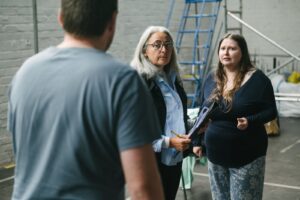
Rehearsals for Intersection (written and directed by Richard D Rhodes)
Alongside the mentorships and writing, I wanted to produce and direct plays: that’s when I got involved with Studio Productions at Bingley Little Theatre. The mentorships helped me realise, pretty quickly, that there was a local need to channel routes into production for new writing. I suggested ITCH, a programme to support new writing and creativity, through Studio Productions. Along the way, my new connections with northern creatives have resulted in some unexpected opportunities, including being a reader for Ann Hamilton’s ‘We Will Sing’, an installation for Bradford 2025 at Salts Mill.
ITCH has now produced several scratch nights, our next being in January; each provides writers with quality R&D feedback, our trick being to get audiences invested in responding to QR-coded surveys. Typically, our Scratch Nights sellout and roughly half of the 80-capacity crowd gives feedback, which is fabulous. Our support for northern script writers (regardless of whether their focus is writing for the stage, screen, audio or beyond) extends to providing regular Lab meetings, in-person and online, which have included input from BBC Writers, amongst others. Supporting new writing and emerging creatives is a passion of mine, as I know it is for Cheryl Martin at Red Ladder. Investing in the future is so important.
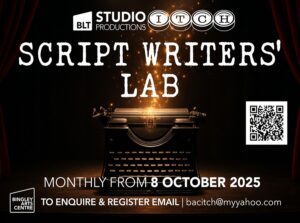
Part of what we’re planning for 2026/27 is to focus on developing new, longer pieces of writing and take them into production, possibly on tour if things go well. And even though Bingley Little Theatre operates as an amateur concern, we’re hoping to pay writers for the performance rights of material that goes into production, which would be the same if we bought in pieces to produce. It’s all about helping writers to hone their craft, to create more opportunities and celebrate it as paid, therefore, professional work. Something for the CV if nothing else.
I’ve been back in Yorkshire for less than three years and I have felt welcomed as part of the wider theatrical and creative scene here. I’ve seen some of my own work produced on stage and have been able to help others get a foot on the ladder. Perhaps most importantly, I’ve discovered a friendly arts community that isn’t self-aggrandising but is all about ensuring we have a local theatrical ecosystem that’s not only surviving but thriving.
Richard is a former head teacher, school governor and bank manager. In 2023, having taken early retirement from education, he moved back to West Yorkshire to pursue his childhood dream of being a writer. He has been mentored by Paines Plough as a playwright and by Channel 4, New Writing North & Screen Yorkshire as a screenwriter. He has had work performed at or produced by Leeds Playhouse, Rise & Howl, Lost Fox Productions, Freedom Studios and Bingley Little Theatre, where he chairs Studio Productions and produces the ITCH programme to foster new writing and creativity. He is on the boards of Script Yorkshire, Red Ladder and Rainbow Home, a charity dedicated to supporting LGBT+ asylum seekers.
Image credits in main text Mark Hillyer
“If we want to see young people thriving in the arts then we need to create more opportunities for them” – Tyler Pickles
I think I was always destined to have a career in the performing arts. As the son of a dance teacher who runs her own dance school I often ended up in her classes. So, for me, dancing and performing was ingrained in me from an early age and I’ve never really seen myself doing anything else.
Whenever I’ve seen someone getting paid to be a dancer or an actor, I’ve always thought ‘that looks like success to me, because you’re doing something that to other people might be a hobby and you’ve made it your job.’ As I’ve grown older I kind of see us as politicians in costume. We’re professional storytellers and it’s something we’ve been doing since the Stone Age with cave paintings, and for me it’s just awesome to be able to turn that storytelling into a profession.
But getting into that profession has arguably never been harder than it is now. Graduates struggling to find work is something we see up and down the country, and if we want to see young people thriving in the arts then we need to give them the chance to show what they can do and create more opportunities.
As a working-class lad from Leeds who’s benefited from people opening doors for me, I know how important this is. When I went to Leeds Conservatoire, I was among the first cohort of their new drama school. On the back of this I got my first professional acting credit with Tutti Frutti, and it’s the same with Dreamers, where Channel 4 did an open casting call. There’s a pattern there of doors being opened, and I wanted to do something similar with Rebel Roots Theatre.
When I founded Rebel Roots Theatre in 2024, the idea was to have a grassroots theatre company dedicated to creating opportunities for working class people, as well as graduates and unrepresented talent, that also supported local communities by going to unconventional theatre spaces. For our first show, Family First (which has just finished its first tour), we went to Leeds Conservatoire and were able to give one of the students, Scarlett Bennett, her first professional credit, which was just brilliant.
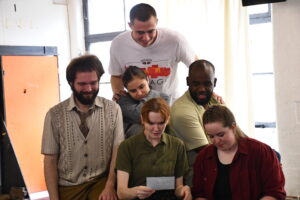
Family First – credit Kennady Faye Photography
I wanted to set up a theatre company like this for years and you reach the point where you think to yourself ‘right, I’m going to take the plunge and just do it.’ It’s been a steep learning curve, but I’ve had so much support and encouragement from other theatre companies in the city like Red Ladder, Wrongsemble and Tutti Frutti, which has helped me get a lot further a lot quicker than if I just sat and googled everything.
When you do something new it can feel a bit scary and yes, failure is always a possibility, but at the end of the day everything you do is a learning curve and that’s how you grow. I remember when Dreamers first came up, I wasn’t going to audition for it because ‘I thought Channel 4 aren’t going to hire me’, but a friend pushed me into it and thank goodness he did.
I’ve been very lucky in my career so far, but I believe more needs to be done to create opportunities for young people, especially those from working class backgrounds. I used to work with a woman in a supermarket and she told me that her granddaughter had been told not to go into the performing arts because it would never lead anywhere. She said, ‘but I’ve seen you in Dreamers, so we’ve encouraged her to go for it.’
I think so many young people are being pushed away from the arts because their families are worried there’s no career in it, which is such a shame. I really want to see it get the funding and support it deserves, because it’s not just about the art and putting on a show, it brings communities together. I’ve seen it myself. My mum’s dance school uses a little hall in Pudsey, and I was able to bring my show there and I got to see a completely different side to the town. We had people in who I’d never met before, which shows how theatre can bring people together.
I really hope Rebel Roots can show working class families, students and graduates that there are opportunities out there, and that you can follow your dreams. One of the ricochet effects has already been that people thinking about setting up their own company have come to us and I’ve been able to connect them to other organisations. My hope now is that we can offer a pathway for young creatives and that five or six projects down the line we’re seen as a place that gives people a chance. If that happens it would be beyond amazing.
Tyler Pickles, 23, is an actor, theatre maker and producer from Pudsey, near Leeds, and a Red Ladder trustee. In 2024 he founded Rebel Roots Theatre Company to help amplify working-class voices, support local spaces, and create work for graduates and unrepresented talent. He graduated from Leeds Conservatoire in 2023 and starred in the Channel 4 series Dreamers.
Main image: Tyler Pickles – credit Ruth Crafer
“I initially thought it was just another migrant story” – theatre writer/performer Margot Przymierska on her latest play, Monument
Margot Przymierska is a Polish-born performer, writer and creative producer now living in the UK. She brings Monument, a powerful theatrical piece that explores the cyclical nature of power, ideology, and human displacement, to West Yorkshire.
Can you tell us about Monument?
The show consists of two separate stories. The first is set in 1948 in communist-era Czechoslovakia and is inspired by a true story. It involves a Soviet apparatchik (a member of a Communist Party) who organises a competition to design the largest Stalin monument in the world, and follows the story of the monument’s construction, brief existence and eventual destruction.
The second revolves around Bogdan, a Polish construction worker who migrates to the UK in the 2000s, chronicling his journey from labourer to successful businessman, set against a backdrop of an increasingly fractious Europe.
I initially thought it was just another migrant story but then I realised from talking to people that a lot of Polish migrants are doing really well in Britain now, they are no longer the underdogs. If anything they’re part of the new middle class.
What made you want to tell these stories?
I come from Poland and being eastern European I try to reflect this culture through my work and what it’s like being a migrant.
There’s been a lot of talk in the UK about decolonisation and this got me thinking about Poland and other eastern European countries being colonised by the Soviets. A lot of my values were forged from the background of that experience which my parents lived through and that gets passed on from one generation to another.
“Polish migrants are doing really well in Britain now. They are no longer the underdogs. If anything, they’re part of the new middle class.”
You moved to the UK in 2003. Why did you decide to come here?
I was born in Białystok, a city in eastern Poland, and I came to the UK for a sense of adventure. I was 18 at the time and didn’t know what I wanted to do with my life, so it was just an intuitive leap. I had a friend living here and initially I was only planning to stay for 10 days but ended up getting a job and I’ve been living and working here ever since.
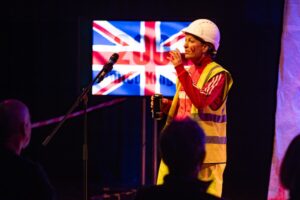
Margot in Monument credit Luminous Photography
How did you end up becoming an actor, writer and performer?
I didn’t manage to get into drama school in Poland, but after a few years living in the UK I was accepted by East 15 Acting School in Essex. I thought I would be an actor but I quickly realised I didn’t just want to re-enact other people’s visions.
I started making my own work and in 2011 I set up the Polish Artists in London network, to bring creatives together. As well as producing work for the stage I’ve done all sorts of jobs in order to stay afloat, everything from looking after horses (which I really didn’t like) to doing interpreting work.
I’m now a co-director and lead creative producer of The People Speak, an art collective that runs workshops and helps connect diverse groups through culture and the arts.
Where did your interest in theatre and performing come from?
When I was a child I remember there was this war series about a bunch of guys who drove a tank and they had a dog. It was a bit of a Soviet propaganda show but I really loved it and I used to reenact scenes for my parents. From that point they thought ‘oh, you’re going to be an actor’ and I think that must have stayed in my head.
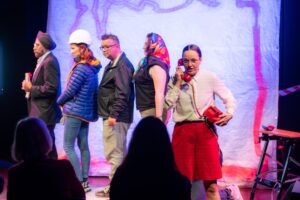
Margot in Monument credit Luminous Photography.
You grew up in Poland at the tail end of the Cold War. How did growing up in a communist country shape your outlook on the world?
In Poland there was quite an abrupt transformation. Suddenly there was the end of communism and you had the free market. People didn’t really know quite how to deal with this change. I remember watching TV adverts thinking they were amazing. It was often for silly things like Mentos mints but I used to tape them on the VHS and watch them back because they were so different.
Communism brought bad things, but people also had a sense of security and their lives were organised. After it collapsed people started becoming more interested in material things and the shared experience that families had before started to be eroded.
“I like stories that are a bit unusual or champion the underdog.”
What are some of the key recurring themes in your work?
I think freedom of expression and identity, but also the cycle of history and what kind of world we’re inheriting. Margaret Thatcher said ‘there’s no such thing as society’ but what is the alternative? We just become a bunch of individuals. It’s difficult to have a shared collective identity as a nation but I think it’s important to try and move forward as a society. I like talking to people from all walks of life and I like stories that are a bit unusual or champion the underdog.
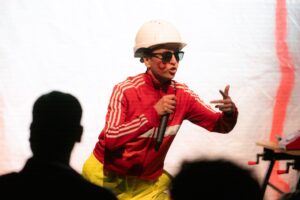
Margot in Monument credit Luminous Photography
How have attitudes towards migrants changed in the UK?
When I first moved here there was maybe a bit of apprehension and looking down on Polish people. Then it was ‘great, cheap labour’. I remember working in a pub and when they found out where I came from, they would say ‘our cleaner is Polish.’ I think migrants who came here 20 years ago just got on with their lives and many of them have gone on to be successful and become important people in their communities and are contributing to the economy. We got into people’s good books and now you can see the attitude is turning again, which does worry me a bit.
Can theatre and art make a difference?
As an artist I feel it’s my responsibility to make work that provokes some kind of reflection, helps tease out questions and piques curiosity, because you don’t know who needs to see that show, or see that performance. They might see it and go ‘yes, this is how I feel’ and it gives them a space to talk about how they feel or share the moment with others, and that’s why it’s so important.
It’s ok to make theatre that doesn’t necessarily fit in or doesn’t fall into a particular category. This is what I love about Red Ladder. They go out to places where people are but where theatre perhaps isn’t and they create opportunities for people to interact with something different. And I think that’s something we all need.
Main picture: Margot Przymierska performing in 2025. (Credit The People Speak)
New Red Ladder Local season on sale now!
As the weather is starting to turn a little nippy, let’s share our brand new Red Ladder Local shows to tempt you out this autumn.
We know we’ve said it before but there really is something for everyone! Have a read and tell us we’re wrong…
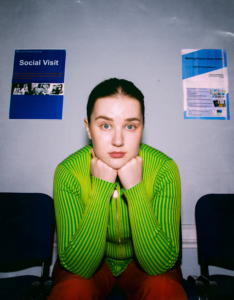
Credit Nathan McGill
KAILEY
Kailey’s mum’s been sent to prison, and she needs to grow up – fast.
Inspired by writer Kerry Wright’s own lived experience, Kailey is a bold new play that shines a light on society’s forgotten young people. Funny and searingly honest, Kailey doesn’t ask for sympathy; it demands you look closer.
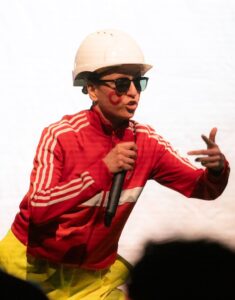
Credit Luminous photography
MONUMENT
A one-woman comedy drag show with audience participation, rap and pickled gherkins.
Set at mysterious construction sites in Czechoslovakia and the UK, Monument asks about the real cost and purpose of hard-work.
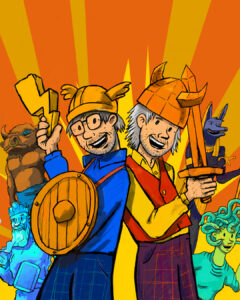
Credit Rubbish Shakespeare Company
STORY FORGE
Two loopy Professors hilariously invent three new myths using cardboard!
Choose the adventure, shape the tale, even be the hero! Legendary family fun from award-winning champions of children’s theatre.
You’d be mad to myth it!
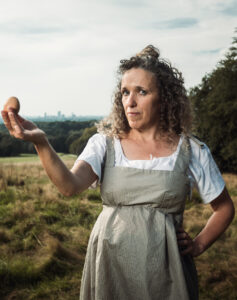
Credit Brave Words
MUTTON
1809. Mary Bateman is about to be hung for witchcraft and murder. Her career of crime has included poisoned pudding, a holy hen, a fire at the mill and…a freshly-shaved leg of MUTTON. A dark comedy, exploring the life of the Yorkshire Witch. And why we should shove patriarchal history firmly up a chicken’s arse.
And of course our touring double bill A Proper Merry Christmess and A Town Called Christmas are now on sale too.
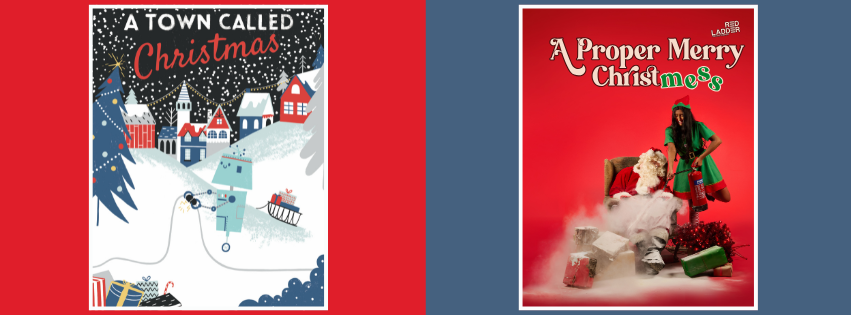 You are not going to want to miss Wrongsemble’s magical family show about the true meaning of the season, and our brand new dark comedy (not for kids) about what Christmas truly means for most of us.
You are not going to want to miss Wrongsemble’s magical family show about the true meaning of the season, and our brand new dark comedy (not for kids) about what Christmas truly means for most of us.
We look forward to seeing you at one or all of the performances!
Main image from Kailey credit Ant Robling
Shining a light on society’s forgotten young people. Meet playwright Kerry Wright.
Kerry Wright is a playwright, producer and facilitator based in Bradford. Originally from Kent, she studied MA Writing for Performance at the University of Leeds. Kerry explores contemporary social and political topics through her work and is passionate about devising theatre with working-class communities and young people. Her play, Kailey, comes to Yorkshire in September.
Can you tell us a little bit about Kailey? Kailey is a comedy drama that follows 18-year-old Kailey as she tries to figure life out while her mum is in prison. It’s her first taste of real independence, navigating a new job, applying to uni, and messy nights out with her best friend, Beth, until things start to spiral. Honest and full of heart, the show asks: ‘Who looks after you when your parent is in prison?’
Where did the idea come from, and why did you want to tell this particular story? The idea has been in development for over five years, and I wanted to tell this particular story as Kailey’s story is inspired by my own. When I was a teenager, both of my parents were in prison, and as a direct result I had to leave the family home and leave college. I found myself in a no-man’s-land of systems that couldn’t help me. It wasn’t until I started doing research for my play that I realised my story isn’t unique, and I wanted to shine a light on thousands of young people who are currently going through it.
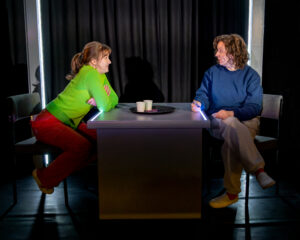
Kailey credit Ant Robling
What inspired you to want to be a writer? I have always been creative and constantly filled notepads with stories and poems as a kid. I would often rewrite film plots that lacked female representation and add myself as a character. My love for creative writing continued throughout my childhood, and I was lucky that I had a teacher in primary school who really encouraged me to write, too. I went on to study English and American Literature with Creative Writing at the University of Kent and then Writing for Performance at the University of Leeds – I was the first person in my family to go to university. This was also the first time that I studied creative writing as a serious subject and I absolutely loved it. It opened a whole new world of literature that I did not know even existed. I then started writing plays, stories, and poems using my own experiences.
Where does your interest in theatre and performance come from? I never really considered it as an option. It wasn’t until a university tutor said that my dialogue-heavy stories would be better as plays that it opened that world for me. So I do have him to thank. If it wasn’t for that comment, it wouldn’t have sparked that interest!
What’s your earliest memory of going to the theatre and was there a memorable production that has stayed with you? The first time I ever went to the theatre was when I was 12 years old. A friend from school invited me to join her and her family to see the local pantomime. I didn’t know what to expect but from the moment the lights went down, I was completely hooked. The energy was electric and the characters were larger than life. It was pure joy. That experience stayed with me for a long time. It was the first time I realised how powerful live performance could be, and how it could bring people together.
What makes writing for the stage so appealing? There’s an immediacy and intimacy that make every performance unique. There’s also something powerful about the limitations of the stage. Working within a confined space pushes you to be more creative with dialogue, character, and structure. It’s often all about the words, the performances, and the connection between the people in the room. Also I love how theatre invites honesty. It’s a place where complex, messy, funny, emotional stories can be told in bold and imaginative ways. That kind of storytelling is so appealing to me.
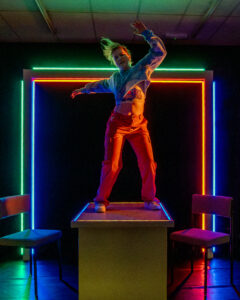
Kerry in Kailey credit Ant Robling
What’s your favourite play, and why? Currently my favourite play is Wasteland by Gary Clarke Company. I loved the way the story was told through the movement of the dancers and the use of music. The music was incredible and I still think about it often.
Why are theatre companies like Red Ladder important for young writers? Theatre companies like Red Ladder are vital for young writers because they create space for new voices to be heard. They don’t just open the door to the industry; they support you through it, offering mentorship, development opportunities, and a genuine belief in the power of untold stories. What makes Red Ladder especially important is their commitment to staging work in non-traditional venues, making theatre that goes out into communities and reaching audiences who might not usually engage with it.
What advice would you pass on to other young writers, or performers, just starting out? My advice would be to take as many opportunities as possible, whether that’s a free workshop, a talk, or cheap shows, as you’ll never stop learning. Also chat to everyone, get to know people whether they are actors, producers, the barista in the theatre café – you never know where the conversation might lead to. Also, do take a break if you need one, I took four months off from developing Kailey and it was the best thing I ever did, as I came back so much more motivated and with a clearer sense of what I wanted to do.
What do you hope audiences take away from watching your play? I hope they leave thinking what a cracking night out they’ve had, but with questions and thoughts on how we can do better as a society for vulnerable young people.
What are you most looking forward to about bringing Kailey to Red Ladder Local venues? I’m excited to bring the show to audiences who might not get to see it otherwise!
Main picture: Kerry Wright credit Nathan McGill
You can book now for Kailey at Red Ladder Local:
St Bartholomew’s Church, Armley, Leeds – Sept 17, 7pm. BOOK TICKETS
The Gate Belle Isle TMO, Leeds – Sept 18, 7pm. BOOK TICKETS
The Cluntergate Centre, Horbury – Sept 20, 7pm, BOOK TICKETS
Cast announcement for Red Ladder and Wrongsemble’s festive theatre double bill
We are delighted to introduce our cast for the Christmas shows we’re taking on tour across the UK later this year with our friends from Wrongsemble.
Our brand-new dark comedy, A Proper Merry Christmess, co-written by Seeta Wrightson and Leon Fleming, hits the road with Wrongsemble’s family show A Town Called Christmas in November. Both will feature the same trio of brilliant actors.
Let’s meet them…
Maryam Ali (Rani/Clementine)
Maryam is an actor and theatre maker based in Teesside. She trained at Manchester School of Theatre and spent several years teaching in primary and SEN education before returning to theatre last year. She is currently developing her first full length play which has been commissioned for an R&D with ARC Stockton.
Her theatre credits include: Titus Andronicus (Theatre Space NE), Wolf! (Kitchen Zoo/Northern Stage), Home from Home (Novo Theatre, R&D), Dear Rachel Corrie (Alphabetti response writing programme), The Interview (Live Theatre, rehearsed reading), and Hamlet (HER productions).
Maryam loves theatre that is full of fun and heart, which is why she is looking forward to being part of this festive double bill!
“I can’t wait to get started with the shows. Red Ladder and Wrongsemble are both gorgeous companies who make really playful, exciting work, so I’m buzzing to be spending Christmas with them!”
Roo Arwen (Red/Glitch)
Roo is a Manchester-based actor, singer, and musician, and a recent graduate of The Arden School of Theatre, and these productions mark her professional theatre debut.
Originally from Bradford, Roo cultivated a deep-rooted passion for performance from an early age. She is passionate about work that explores meaningful themes of connection and lived experience, with a particular love for comedy.
In addition to her work as an actor, she is also a professional singer, regularly performing, writing, and producing her own music across the North.
“I cannot put into words how excited I am to begin this new chapter with Red Ladder and Wrongsemble this Christmas. As a recent drama school graduate, it feels especially meaningful and sentimental for me – taking me back to being a young girl, inspired to act by the magic of local Christmas shows. I can’t wait to share these stories and hopefully spark that same joy in others!’
Charles Doherty (Michael/Tim)
Charles was raised in Australia (yes, the accent slips out occasionally) and trained at the Western Australian Academy of Performing Arts before moving to the UK. He now calls the North his home, working as an actor and singer across stage, screen, opera, and musical theatre.
His career has seen him play singing cats (Cats), gothic dads (The Addams Family), and even the devil himself (Jerry Springer the Opera) – he also picked up a NODA Award as King Arthur (Spamalot).
He’s toured internationally in Joseph and the Amazing Technicolour Dreamcoat, Evita, and Oliver! And on screen, he’s popped up in The Tattooist of Auschwitz, John Carpenter’s Suburban Screams and The Toys That Built America – to name just a few.
Charles loves stories that bring people together and is thrilled to be part of this festive adventure.
“I’m looking forward to reclaiming the energy and fun of grass roots theatre!”
“I thought if I called myself a ‘disabled actor’ people wouldn’t want to work with me. But it’s important, it’s part of my identity.” – Lara Wilson
For as long as I can remember I’ve loved being creative. At school I enjoyed reading and writing stories and I loved going to the theatre to watch musicals with my parents. When I was nine, I joined East Leeds Youth Theatre and that’s what really sparked my passion for performing and being on stage. It was like stepping into another world.
The theatre was run by a lovely lady called Sara Allkins and we created many wonderful shows, performing in different venues across Leeds. Sadly, the youth theatre no longer exists but I adored it and I cherish those memories.
As someone who has cerebral palsy and is an ambulatory wheelchair user, getting the chance to act on stage was exhilarating. It’s something I was able to further explore when I joined the BA acting course at Leeds Conservatoire, where I spent three amazing years.
The stage is my passion but because I have cerebral palsy I sometimes doubted whether I could be a performer, or whether I could realistically do this as a career. But Leeds Conservatoire and especially Erin Carter, who is head of drama there, encouraged me to embrace having a wheelchair and to use it as a creative tool, rather than seeing it as a hindrance or a barrier. That was a liberating moment for me and boosted my self-belief.

Lara Wilson performing as Mercutio in Leeds Conservatoire & Leeds Playhouse’s co-production of Romeo and Juliet credit Cian O’Riain
In the past I tried to downplay my condition. I thought if I called myself a ‘disabled actor’ people wouldn’t want to work with me. But it’s important, it’s part of my identity. In my third year I played Mercutio in Romeo and Juliet at Leeds Playhouse, and I made the artistic choice to perform both in and out of my wheelchair, using it as a creative tool – a choice I wouldn’t have made previously.
This gave me the confidence to do Red Ladder’s directors’ workshop last year, which was run by Cheryl Martin, the artistic director. I really enjoyed it and a couple of months ago Cheryl said she was running the course again and asked if I’d like to be her assistant director, so I jumped at the chance. I learned what it’s like to run a rehearsal room as well as all the admin side of things. Cheryl also invited me to direct one of the rehearsed readings at the recent Leeds Theatre Festival, which was amazing. I got to be part of the audition process which was really insightful both from an acting and directing perspective.
I directed the rehearsed reading of Sameer Ali’s dark comedy Bring Me the Head of Dr Vohra. We had five actors who were a joy to direct, which made my job so much easier. The writer really liked what we did with the characters. That was important because you want to do the best you can with someone else’s work. And the audience loved it too. It was a brilliant experience and really gave me confidence and made me think ‘I can do this – I’m good at it.’

Lara directing on Red Ladder Course credit Sara Nelson
I’m grateful to have had the opportunity to do something I love, but the fact is people with disabilities are still hugely underrepresented not only in the arts, but many professions. According to statistics from 2023, more than 16 million people in the UK have a disability of some kind, that’s 24% of the total population – or almost one in four of us!
There are so many more disabled people out there than we realise, and I think attitudes are shifting. There’s growing awareness and representation of disabilities which has to be a good thing – and theatre has played a part in this. I love how it can give a voice to people who aren’t normally seen, it’s certainly increased my own awareness of other disabilities.
The beauty of theatre is it can entertain as well as educate, it has the power to start a conversation and shape people’s perceptions. This is something that should be harnessed. We need to show young people, no matter who they are or what their background, that they can have a career in the arts. Which is why it’s so important they get the opportunity to develop their skills and thrive, and places like Red Ladder and Leeds Playhouse are doing exactly that, they’re making theatre more accessible.
Last year, when I did the Red Ladder course there were multiple people with disabilities and for me it was nice to feel like I wasn’t the only one. I didn’t realise how good it would feel to be surrounded by other wheelchair users until I experienced it.
But it’s not only important that opportunities exist in the arts for those with disabilities, we also need to make sure there are viable pathways that young people can follow, so they know they can enjoy a successful and rewarding career in the theatre, whether it’s acting, writing, directing or all three.
At the end of the day it’s about giving people the chance to follow their dreams and the opportunity to do something they’re good at and passionate about. And, perhaps most importantly of all, it’s about giving them a voice.
Lara Wilson is a disabled Yorkshire-based actor and theatre maker, and a graduate of Leeds Conservatoire’s BA Acting course. In 2023, she performed in Leeds Playhouse’s co-production of Romeo and Juliet as Mercutio and has worked with Red Ladder as an assistant director.
Lara portrait credit: Emily Goldie
“Red Ladder is all about finding and championing unheard voices, and our partnerships and collaborations help us achieve this” – Cheryl Martin
Red Ladder has a long history of fruitful partnerships and collaborations. It’s something we’ve been doing long before I came here, and it’s something I’m keen to continue.
After the workshops I ran for Red Ladder last summer I could have hired at least half of all the actors, writers and directors who took part. Sadly, there isn’t enough money for that, but it made me realise just how much artistic talent there is not only in Leeds, but beyond, and as an artistic director I want to try and nurture as many budding actors, writers and directors as possible.
And collaborating is crucial for this. The reality is you get more bang for your buck when you work with others which is why we have recently reignited our partnership with Leeds Conservatoire. Earlier in the year I directed their second year acting students. I enjoyed it immensely and was really impressed by their ability and professionalism. This week, we’re working with them as part of their Leeds Theatre Festival. We’re producing a series of readings of original works from four brilliant new northern writers, performed by Conservatoire undergraduates and graduates. Plus a scratch night featuring extracts created by playwrights from last summer’s Red Ladder writers’ workshops.
Separate from the festival, but based at the Conservatoire, we have a special evening when the actors, directors and writers from our 2025 workshops will present a series of new pieces.
All of these events are open to the public. And you can book here.

Seeing these young people working together, learning and sharing new ideas has been inspiring and energising and tells me that as an organisation, Red Ladder is on the right path.
The whole Leeds theatre ecology benefits from partnerships like this because writers have a platform for their work which gets seen by the public as well as bigwigs from the local and regional theatre industry who are always on the lookout for new talent.
All of this is important to me personally because I had loads of support when I was starting out. I had residencies as a writer from the very beginning of my career with professional theatre companies, and when I became a director I had bursaries from the Arts Council that paid for me to be an assistant. The connections I made through this helped me get the rights to a play that I later won a major award for. Without this support I would have really struggled, and yet none of the opportunities I had is there anymore.
Something has to fill this gap and provide opportunities to all the emerging talent that I know is out there. Which is where partnerships between theatre companies and arts organisations come in. By collaborating with one another we’re able to reach more people and become greater than the sum of our parts. That’s why Red Ladder is collaborating with organisations like Leeds Conservatoire and the theatre company Wrongsemble, who are also just down the road from us.
We’re joining forces with Wrongsemble to take a double bill of Christmas shows on tour across the UK later this year, including our new comedy, A Proper Merry Christmess, written by Leon Fleming and debut playwright Seeta Wrightson, who came through Red Ladder’s workshops in 2024.

Our collaboration with Wrongsemble makes touring more viable for both of us, because we’re sharing the cast which means our money goes further. It also enables us to tap into each other’s expertise and knowledge – it’s a no-brainer!
Red Ladder is all about finding and championing unheard voices, and our partnerships and collaborations help us achieve this. We’re always looking for plays and shows that we can do and new writers to work with, and one of our pledges is that we will always read the first 10 pages of every script we get sent. We can’t develop all of them, but we feel this is a more inclusive way of finding new talent.
For both our last big show, Sanctuary, and our new one, A Proper Merry Christmess, we had open call outs for actors meaning it was open to anyone. And that’s the idea. We’re not a closed shop, we want people to feel they can come to us.
But it’s not just about Red Ladder. In the future I’d love to see some of the people who have collaborated with us, or come through our workshops and courses, to start working together – kind of like a ‘grow your own’ talent pool. I’d love to see new arts and theatre companies forming as a result of all this. That’s our vision. That’s our dream – and there’s no reason why it can’t happen.
Recent News
- The rise and fall of Mary Bateman – aka ‘the Yorkshire Witch’ – with MUTTON writer and Brave Words’ artistic director Chris Singleton
- “Art is a human right and we should all have the opportunity to be creative.” – Coralie Datta
- “Despite the funding challenges that exist today in the creative world, there are still a heck of a lot of opportunities and resources in the North.” – Richard D Rhodes
- “If we want to see young people thriving in the arts then we need to create more opportunities for them” – Tyler Pickles
- “I initially thought it was just another migrant story” – theatre writer/performer Margot Przymierska on her latest play, Monument
News Archive
- November 2025
- October 2025
- September 2025
- August 2025
- July 2025
- June 2025
- May 2025
- April 2025
- March 2025
- February 2025
- January 2025
- December 2024
- November 2024
- September 2024
- August 2024
- July 2024
- June 2024
- May 2024
- April 2024
- March 2024
- February 2024
- January 2024
- December 2023
- October 2023
- July 2023
- June 2023
- May 2023
- March 2023
- February 2023
- December 2022
- November 2022
- May 2022
- March 2022
- February 2022
- August 2021
- November 2020
- October 2020
- September 2020
- May 2020
- March 2020
- February 2020
- August 2019
- July 2019
- February 2019
- January 2019
- December 2018
- October 2018
- July 2018
- May 2018
- April 2018
- January 2018
- December 2017
- November 2017
- September 2017
- August 2017
- July 2017
- June 2017
- May 2017
- December 2016
- November 2016
- September 2016
- July 2016
- June 2016
- May 2016
- April 2016
- February 2016
- September 2015
- August 2015
- July 2015
- April 2015
- February 2015
- January 2015
- December 2014
- November 2014
- October 2014
- July 2014
- May 2014
- April 2014
- March 2014
- February 2014
- November 2013
- September 2013
- July 2013
- June 2013
- April 2013
- March 2013
- February 2013
- November 2012
- September 2012

